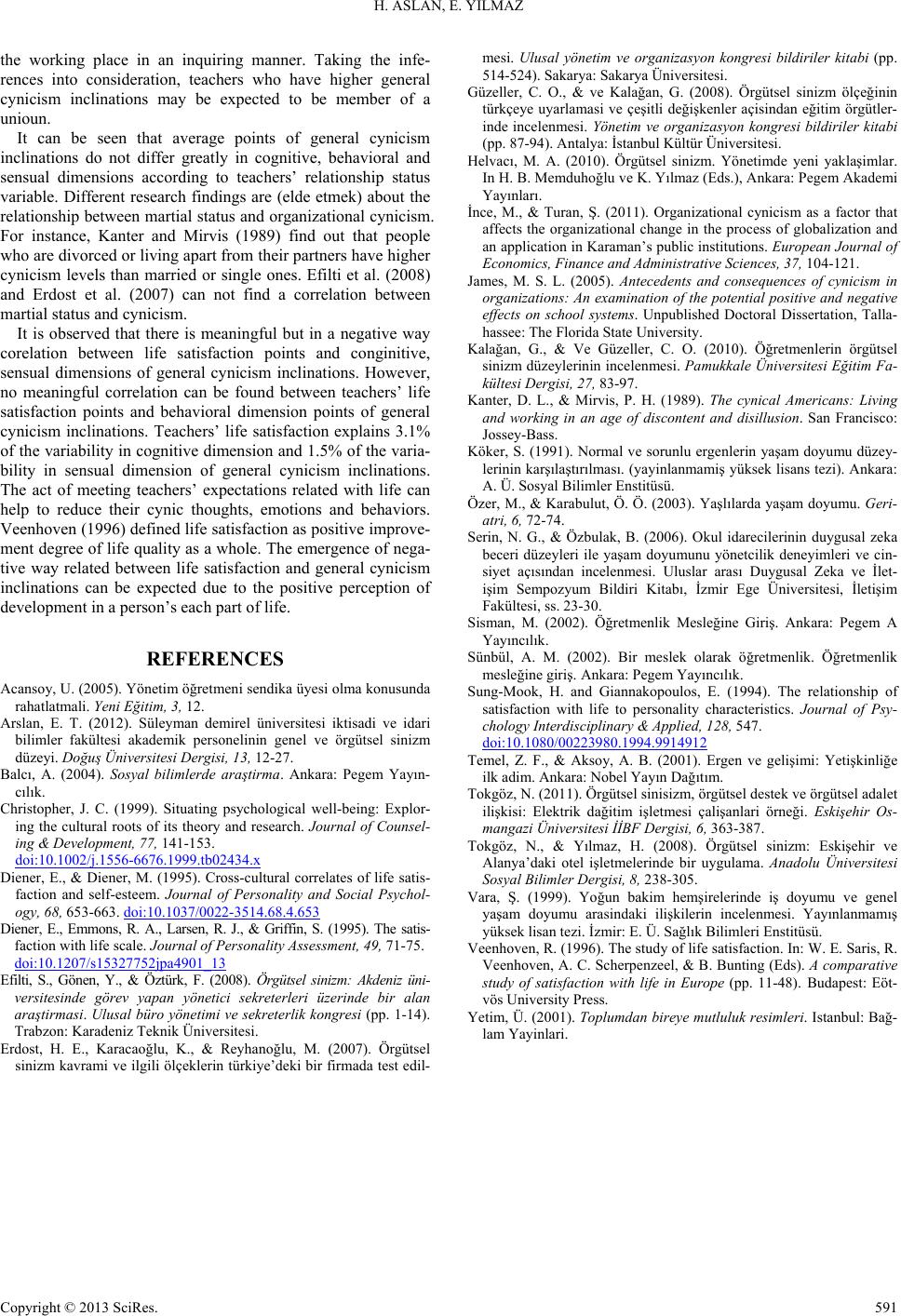
H. ASLAN, E. YILMAZ
Copyright © 2013 SciRes. 591
the working place in an inquiring manner. Taking the infe-
rences into consideration, teachers who have higher general
cynicism inclinations may be expected to be member of a
unioun.
It can be seen that average points of general cynicism
inclinations do not differ greatly in cognitive, behavioral and
sensual dimensions according to teachers’ relationship status
variable. Different research findings are (elde etmek) about the
relationship between martial status and organizational cynicism.
For instance, Kanter and Mirvis (1989) find out that people
who are divorced or living apart from their partners have higher
cynicism levels than married or single ones. Efilti et al. (2008)
and Erdost et al. (2007) can not find a correlation between
martial status and cynicism.
It is observed that there is meaningful but in a negative way
corelation between life satisfaction points and conginitive,
sensual dimensions of general cynicism inclinations. However,
no meaningful correlation can be found between teachers’ life
satisfaction points and behavioral dimension points of general
cynicism inclinations. Teachers’ life satisfaction explains 3.1%
of the variability in cognitive dimension and 1.5% of the varia-
bility in sensual dimension of general cynicism inclinations.
The act of meeting teachers’ expectations related with life can
help to reduce their cynic thoughts, emotions and behaviors.
Veenhoven (1996) defined life satisfaction as positive improve-
ment degree of life quality as a whole. The emergence of nega-
tive way related between life satisfaction and general cynicism
inclinations can be expected due to the positive perception of
development in a person’s each part of life.
REFERENCES
Acansoy, U. (2005). Yönetim öğretmeni sendika üyesi olma konusunda
rahatlatmali. Yeni Eğitim, 3, 12.
Arslan, E. T. (2012). Süleyman demirel üniversitesi iktisadi ve idari
bilimler fakültesi akademik personelinin genel ve örgütsel sinizm
düzeyi. Doğuş Üniversitesi Dergisi, 13, 12-27.
Balcı, A. (2004). Sosyal bilimlerde araştirma. Ankara: Pegem Yayın-
cılık.
Christopher, J. C. (1999). Situating psychological well-being: Explor-
ing the cultural roots of its theory and research. Journal of Counsel-
ing & Development, 77, 141-153.
doi:10.1002/j.1556-6676.1999.tb02434.x
Diener, E., & Diener, M. (1995). Cross-cultural correlates of life satis-
faction and self-esteem. Journal of Personality and Social Psychol-
ogy, 68, 653-663. doi:10.1037/0022-3514.68.4.653
Diener, E., Emmons, R. A., Larsen, R. J., & Griffin, S. (1995). The satis-
faction with life scale. Journal of Personality Assessment, 49, 71-75.
doi:10.1207/s15327752jpa4901_13
Efilti, S., Gönen, Y., & Öztürk, F. (2008). Örgütsel sinizm: Akdeniz üni-
versitesinde görev yapan yönetici sekreterleri üzerinde bir alan
araştirmasi. Ulusal büro yönetimi ve sekreterlik kongresi (pp. 1-14).
Trabzon: Karadeniz Teknik Üniversitesi.
Erdost, H. E., Karacaoğlu, K., & Reyhanoğlu, M. (2007). Örgütsel
sinizm kavrami ve ilgili ölçeklerin türkiye’deki bir firmada test edil-
mesi. Ulusal yönetim ve organizasyon kongresi bildiriler kitabi (pp.
514-524). Sakarya: Sakarya Üniversitesi.
Güzeller, C. O., & ve Kalağan, G. (2008). Örgütsel sinizm ölçeğinin
türkçeye uyarlamasi ve çeşitli değişkenler açisindan eğitim örgütler-
inde incelenmesi. Yönetim ve organizasyon kongresi bildiriler kitabi
(pp. 87-94). Antalya: İstanbul Kültür Üniversitesi.
Helvacı, M. A. (2010). Örgütsel sinizm. Yönetimde yeni yaklaşimlar.
In H. B. Memduhoğlu ve K. Yılmaz (Eds.), Ankara: Pegem Akademi
Yayınları.
İnce, M., & Turan, Ş. (2011). Organizational cynicism as a factor that
affects the organizational change in the process of globalization and
an application in Karaman’s public institutions. European Journal of
Economics, Finance and Administrative Sciences, 37, 104-121.
James, M. S. L. (2005). Antecedents and consequences of cynicism in
organizations: An examination of the potential positive and negative
effects on school systems. Unpublished Doctoral Dissertation, Talla-
hassee: The Florida State University.
Kalağan, G., & Ve Güzeller, C. O. (2010). Öğretmenlerin örgütsel
sinizm düzeylerinin incelenmesi. Pamukkale Üniversitesi Eğitim Fa-
kültesi Dergisi, 27, 83-97.
Kanter, D. L., & Mirvis, P. H. (1989). The cynical Americans: Living
and working in an age of discontent and disillusion. San Francisco:
Jossey-Bass.
Köker, S. (1991). Normal ve sorunlu ergenlerin yaşam doyumu düzey-
lerinin karşılaştırılması. (yayinlanmamiş yüksek lisans tezi). Ankara:
A. Ü. Sosyal Bilimler Enstitüsü.
Özer, M., & Karabulut, Ö. Ö. (2003). Yaşlılarda yaşam doyumu. Geri-
atri, 6, 72-74.
Serin, N. G., & Özbulak, B. (2006). Okul idarecilerinin duygusal zeka
beceri düzeyleri ile yaşam doyumunu yönetcilik deneyimleri ve cin-
siyet açısından incelenmesi. Uluslar arası Duygusal Zeka ve İlet-
işim Sempozyum Bildiri Kitabı, İzmir Ege Üniversitesi, İletişim
Fakültesi, ss. 23-30.
Sisman, M. (2002). Öğretmenlik Mesleğine Giriş. Ankara: Pegem A
Yayıncılık.
Sünbül, A. M. (2002). Bir meslek olarak öğretmenlik. Öğretmenlik
mesleğine giriş. Ankara: Pegem Yayıncılık.
Sung-Mook, H. and Giannakopoulos, E. (1994). The relationship of
satisfaction with life to personality characteristics. Journal of Psy-
chology Interdisciplinary & Applied, 128, 547.
doi:10.1080/00223980.1994.9914912
Temel, Z. F., & Aksoy, A. B. (2001). Ergen ve gelişimi: Yetişkinliğe
ilk adim. Ankara: Nobel Yayın Dağıtım.
Tokgöz, N. (2011). Örgütsel sinisizm, örgütsel destek ve örgütsel adalet
ilişkisi: Elektrik dağitim işletmesi çalişanlari örneği. Eskişehir Os-
mangazi Üniversitesi İİBF Dergisi, 6, 363-387.
Tokgöz, N., & Yılmaz, H. (2008). Örgütsel sinizm: Eskişehir ve
Alanya’daki otel işletmelerinde bir uygulama. Anadolu Üniversitesi
Sosyal Bilimler Dergisi, 8, 238-305.
Vara, Ş. (1999). Yoğun bakim hemşirelerinde iş doyumu ve genel
yaşam doyumu arasindaki ilişkilerin incelenmesi. Yayınlanmamış
yüksek lisan tezi. İzmir: E. Ü. Sağlık Bilimleri Enstitüsü.
Veenhoven, R. (1996). The study of life satisfaction. In: W. E. Saris, R.
Veenhoven, A. C. Scherpenzeel, & B. Bunting (Eds). A comparative
study of satisfaction with life in Europe (pp. 11-48). Budapest: Eöt-
vös University Press.
Yetim, Ü. (2001). Toplumdan bireye mutluluk resimleri. Istanbul: Bağ-
lam Yayinlari.